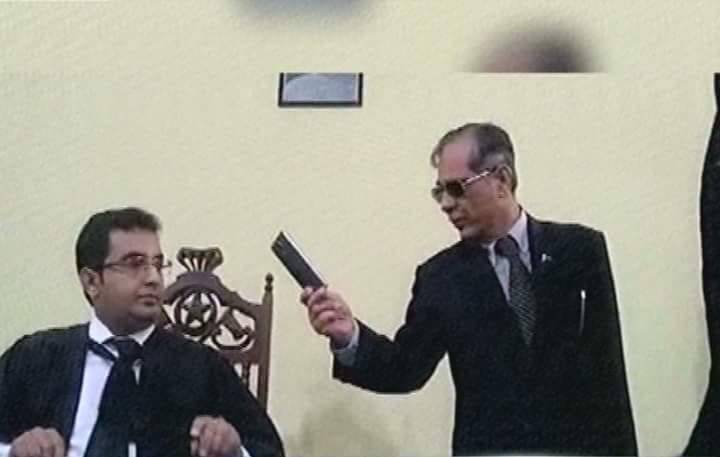
 Barrister Haaris Ramzan argues that judges ought to conduct themselves ethically in courts. When lawyers are insulted in front of their clients, it has a demoralising effect.
Barrister Haaris Ramzan argues that judges ought to conduct themselves ethically in courts. When lawyers are insulted in front of their clients, it has a demoralising effect.My father, an ardent follower of history, always cites the stature of Quaid-e-Azam Jinnah as a profound leader who was amongst the finest lawyers the Indian subcontinent has ever produced. Amongst the narrations is the famous incident of the exchange of heated arguments between Barrister Jinnah and an English Magistrate where the latter vehemently told the former: “Mr. Jinnah you are not arguing before a third class magistrate.” To which Mr. Jinnah firmly replied by stating, “Your Honor you are also not in conversation with a third class barrister.
This incident has been quoted umpteen times not only by historians but also before young law students who are told to be firm in their arguments and uphold the rule of law.
Now coming to the present times, I question myself as to where we stand. Having a practice of more than a decade, whenever I critically evaluate the entire justice system, I find myself in heebie-jeebies. I firstly evaluate as to what is actually happening around us! The top judge(s) come and go, leaving behind a legacy where personal glorification reigns supreme over the reform of the judicial infrastructure as a whole. A lot has already been said and done including the creation of new courts, working on the capacity building of judges, giving inspirational speeches etc. But unfortunately on ground, nothing concrete has changed.
Let us start by evaluating the induction of judges at the subordinate and the superior levels. The path of subordinate judiciary initiates with a simple threshold of a few years of practice and ‘an exam’ including viva which decides that a person can become a civil judge. Through this exam, there is no methodology which evaluates the ability of a person as to whether the individual has the requisite understanding and wisdom of becoming a judge - someone who would decide cases under the higher levels of pressure. These individuals mostly hail from humble backgrounds that are made to work in extremely average work conditions with lack of modern learning infrastructure available and no room for use of judicial acumen. There have been certain improvements. However, they remain cosmetic in nature.
The most perturbing area is the vulnerability of these judges. The subordinate judiciary is highly susceptible to influence both from the higher echelons and monetary gains, whichever comes first. There is a very poor system of accountability which gives these individuals the leverage to twist and turn the grey areas of law. The worst aspect is the unholy connivance of the bar and the bench which has produced a cult of lawyers who charge exorbitant fee in exchange of guaranteed decision.
This trend in the market has been available for decades. Those unfortunate few who lack the ability to develop this bond resort to violence and undue influence- an example of which is the recent attack on the Punjab Institute of Cardiology.
A comforting aspect in the past was presence of lawyers of higher moral standards both within the bench and the bar who would resist such temptations. This would give space to those lawyers who wished to practice their profession in an ethical manner. Such were the legends who lived a simple temptation free existence and engraved their names in the annals of history.
The position at present has worsened tremendously. Corruption is entrenched at the grass root levels and what to talk of the legal fraternity where the entire population has become corrupt. These days a litigant is not bothered by the reputation or brilliance of a lawyer. Rather he is most interested in getting favorable decisions without the concern of fairness and morality. Such happens in connivance with equally supportive black sheep within the profession who make substantial gains without any religious or moral/ethical remorse.
Coming back to the bench, the situation with reference to the superior judiciary is very different. This involves the induction of judges at the High Court level leading up to the Supreme Court. Here eighty per cent of the lawyers with more than 15 years of practice, a license of Supreme Court, reasonable reputation and command over law and procedure are considered for induction as High Court Judges. The rest of the 20 percent is filled by the subordinate judges who have already spent nearly three decades in subordinate courts. The Chief Justice of the respective province prepares a list of these prospective judges using his sources within bar and sends the list to the Chief Justice of Pakistan who presents the same before the Parliamentary commission.
Even though the process seems merit based; unfortunately the results are bleak. This list of judges generally contains the names of individuals who pass the test of favoritism, nepotism, political/related influences etc. A living example of the same is the trend in the majority of lawyers who show their habitual obedience towards judges to gain their favors in cases; and there is another breed of lawyers who use the ladder of bar elections as a strong tool to gain more leverage, pecuniary benefits and social or political status.
The most unfortunate part is that these election based lawyers invest heavy amounts on lavish dinners and gifts and in the process misguide younger lawyers by making them a part of useless election campaigns which result in the carnage of valuable time which these young lawyers would otherwise have spent learning.
Once a judge is appointed at the High Court, the general trend is that he/she operates under their own will and whims. The salient feature here is the extreme lack of patience to listen to the submissions of the lawyers. The judge, while reading the case files a day before, makes his mind about the case leaving very little room for the lawyers to express their arguments in the court. Commonly, the judges ask random questions from a file of thousands of pages seeking explanation of few points and that’s all. The lawyer is left wondering as to whether he was able to explain his point for which he may have researched for days.
To add to the misery, the judges have different views about interpreting the law. There are set(s) of contrasting precedents available and an utter confusion as to what to follow. Getting relief from the judges is synonymous to winning world war III.
Lawyers are generally insulted in open courts and that too in front of their clients which leave a demoralizing impact, resulting in the client withdrawing their power of attorney. This picture is a little different with senior lawyers or those known to the judges personally who are respected and given relief in the tightest of situations.
The current situation is alarming. Former chief justice(s) rather than making the institution stronger and robust has e focused more on projecting their super human image by providing justice like medieval kings and have left the system in a state of disarray.
One really hopes that chief justices would start focusing on the systemic issues and delays that afflict thousands of litigants rather than using their offices for self-projection and building auras of invincibility. They have to retire one day!
